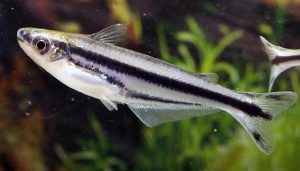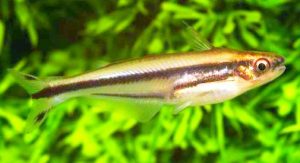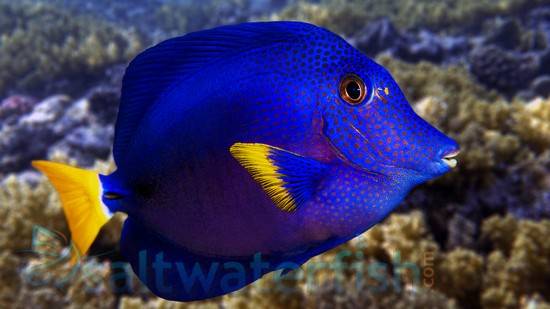Debauwi Catfish (Pareutropius debauwi) commonly known to tropical fish keeping enthusiasts as African Glass Catfish, Dwarf Pangasius, or Striped African Glass Catfish are native to the Republic of the Congo, the Democratic Republic of the Congo, the Central African Republic, and Gabon, Africa.
Debauwi Catfish are a small, shy, active, schooling species that are commonly found in flood planes and a number of central African rivers in the Congo River drainage. They are opportunistic feeders that eat worms, crustaceans, insects, and plant matter found on the bottoms of the moderately flowing streams and rivers they inhabit.
Pareutropius debauwi are a long, slender species that is often misidentified as Pareutropius buffei, especially as juveniles. They have a forked caudal fin, a single black mid lateral stripe, and a faint stripe low on the body from the head to the unspotted caudal fin.
Adults Pareutropius debauwi have one lateral stripe along the silvery white body, while Pareutropius buffei have three.
Pareutropius buffei also have black spots on the upper and lower portions of their rounded lobed caudal fins.
Pareutropius debauwi have pointed caudal fin lobes which lack spots, and a black adipose fin. Pareutropious buffei have clear adipose fins.
Sexing Debauwi Catfish is somewhat difficult unless they are grouped together, but females generally have thicker bodies than males.
Debauwi Catfish are best kept in small schools of at least 5 to 6 individuals however, they do well with other active, peaceful species including African Tetras, Loaches, etc. in a community tank environment.
Debauwi Catfish are best kept in a densely planted aquarium of at least 55 gallon capacity with a dark sand or fine gravel substrate, some smooth river rock, a couple of pieces of driftwood
or bogwood for shelter, plenty of free swimming space, and some floating plants to diffuse overhead lighting. They are sensitive to bright lighting and poor water quality, and require a good filtration system and a small power head to provide a moderate amount of water movement in the tank. Regular bi-weekly water changes are recommended.
There are no reports of Pareutropius debauwi being bred in an aquarium environment however it is possible.
Both Pareutropius debauwi and Pareutropius buffei are egg scatterers that during the rainy season in their natural habitat lay their eggs among fine leaved aquatic plants.
A separate breeding tank densely planted with clumps of Java Moss or other fine leaved plants is recommended if you are serious about trying to breed this species. Keep the pH around 6.5 to 7.0 and the water temperature at around 80°F.
Condition the fish with live or frozen bloodworms, tubifex
, etc. and remove the two fattest females and one male into the breeding tank. If spawning occurs, it will be early in the morning. The females will deposit up to 100 white eggs in the Java Moss
, which should be removed from the tank immediately following the spawn. The parents will eat the eggs if left in the breeding tank.
The eggs will hatch within 72 hours and the fry can be fed microworms or newly hatched brine shrimp immediately after they have absorbed their yolk sacs.
Debauwi Catfish are not difficult to feed. They will eagerly accept catfish pellets, shrimp pellets, a good quality flake food as well as live, frozen, and freeze dried bloodworms
, tubifex, brine shrimp, etc. Two or three small daily feedings are recommended.
Debauwi Catfish (Pareutropius debauwi) are seldom imported and are not common in the aquarium trade. Most tropical fish keeping enthusiasts are actually sold Pareutropius buffei as Debauwi Catfish.
Minimum Tank Size: 55 gallons
Care Level: Moderate
Temperament: Peaceful
Aquarium Hardiness: Relatively Hardy
Water Conditions: 73.4-81.8°F, 5-15 °d, pH 6.4 – 7.5
Max. Size: 4″
Color Form: Black, White
Diet: Omnivore
Compatibility: Shoaling, Community
Origin: Africa
Family: Schilbeidae
Lifespan: 5-8 years
Aquarist Experience Level: Advanced




I’ve searched for the African Debauwi Cat for a while now.